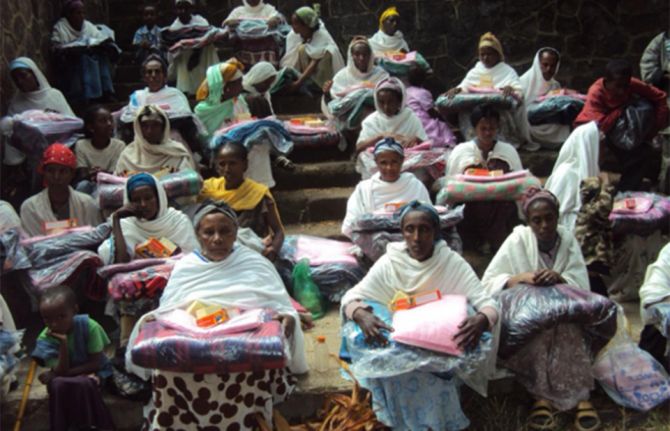

Press Release
UNAIDS calls for urgent global response to Monkeypox Public Health Emergency with rights-based public health and equitable access to vaccines
23 July 2022 23 July 2022GENEVA, 23 July 2022—UNAIDS today called on governments to respond urgently to the World Health Organization declaration of Monkeypox as a Public Health Emergency of International Concern. WHO has received reports over 16 thousand cases in 75 countries. The outbreak is occurring particularly, but not exclusively, among gay men and other men who have sex with men.
“The World Health Organization has issued an urgent call today based on clear evidence that Monkeypox represents a global threat to the health of communities and requires a global response,” said Dr. Matthew Kavanagh, UNAIDS Deputy Executive Director a.i. “This outbreak can be stopped if governments, healthcare providers, communities, and pharmaceutical companies act with urgency. Drawing on the hard-learnt lessons of the response to the AIDS pandemic, effective public health actions must be guided by the principles of solidarity, equality, nondiscrimination and inclusion. The virus, spread through close contact, can affect anyone. But it is currently most impacting gay men and other men who have sex with men, who in many communities face discrimination. Stigma and discrimination undermine epidemic response, sending people with symptoms underground and failing to address the underlying barriers that people face in attempting to protect their own health and that of their community. It can also cause public health authorities to act with insufficient urgency. We urge people to demonstrate compassion to those affected, not discrimination. UNAIDS is urging countries to partner and engage affected communities in the development, implementation, and monitoring of all stages of the response.
“We are concerned that some low- and middle-income countries are struggling to get access to vaccines being deployed now in high income countries. Repeating vaccine nationalism and inequality will prolong the outbreak and unjustly deepen suffering from this virus. We call on governments and vaccine manufacturers to work together to ensure that all those in need can access and benefit from vaccines, including people affected in endemic countries.
“UNAIDS would like to acknowledge the leadership of organizations led by communities of gay, bisexual and other men who have sex with men that, in many countries, have been stepping forward in responding to the outbreak, raising awareness, challenging misinformation and supporting vaccination efforts.”
The Monkeypox outbreak illustrates that communities will continue to face threats from viruses, and that international coordination and solidarity is essential for public health as viruses can only be overcome globally.
UNAIDS urges all media covering Monkeypox to follow the regular updates being issued by WHO.
UNAIDS
The Joint United Nations Programme on HIV/AIDS (UNAIDS) leads and inspires the world to achieve its shared vision of zero new HIV infections, zero discrimination and zero AIDS-related deaths. UNAIDS unites the efforts of 11 UN organizations—UNHCR, UNICEF, WFP, UNDP, UNFPA, UNODC, UN Women, ILO, UNESCO, WHO and the World Bank—and works closely with global and national partners towards ending the AIDS epidemic by 2030 as part of the Sustainable Development Goals. Learn more at unaids.org and connect with us on Facebook, Twitter, Instagram and YouTube.

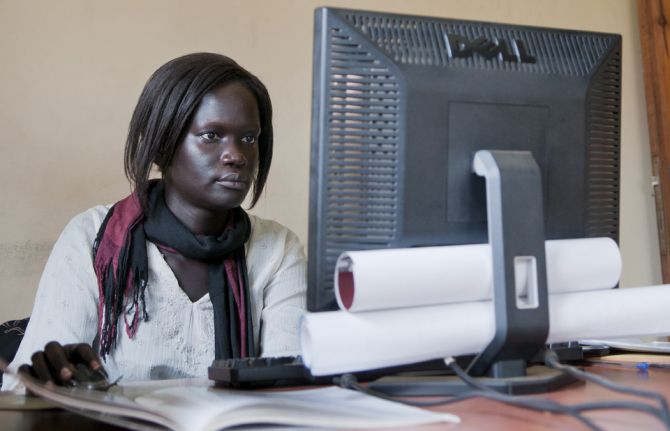
Update
Almost 5 million workers reached under ILO’s VCT@WORK initiative and 3 million tested for HIV
14 July 2016
14 July 2016 14 July 2016The International Labour Organization (ILO) has announced that the initial phase of its VCT@WORK initiative has reached close to 5 million workers with face-to-face education on the benefits of HIV testing. During the outreach, which took place between July 2013 and December 2015, almost 3 million workers were tested for HIV, and more than 85 000 people who tested positive for HIV were referred to services for treatment. The ILO, UNAIDS and partners will present the results of the initiative at the 21st International AIDS Conference, taking place from 18 to 22 July in Durban, South Africa.
Quotes
“For the first time, we have results that clearly demonstrate the impact of a workplace response to HIV. When workers have timely knowledge of their HIV status, they can take the right treatment and continue to be healthy and productive members of the workforce.”
“This is the kind of innovation needed to reach people with HIV services in their everyday lives. This is the Fast-Track response in action—normalizing testing and ensuring more people know their HIV status and are linked with local care and support.”
Related
 Multisectoral resilience to funding cuts in Guatemala
Multisectoral resilience to funding cuts in Guatemala

22 December 2025

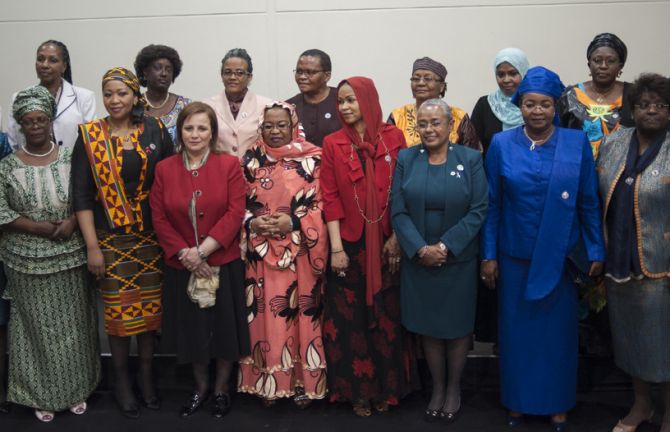
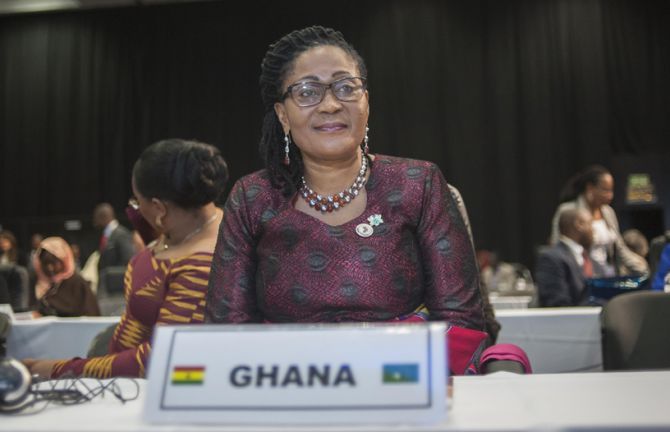
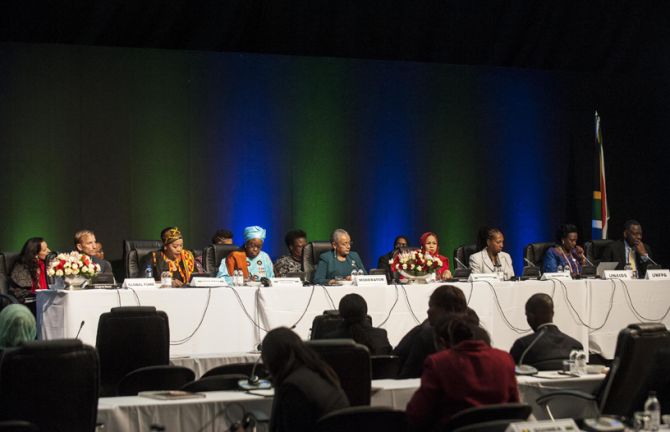
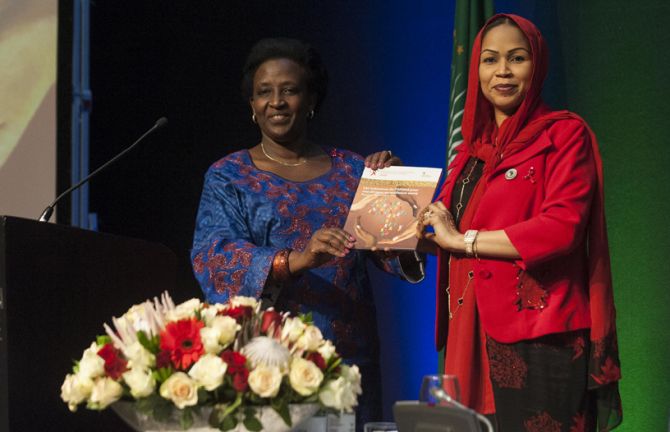
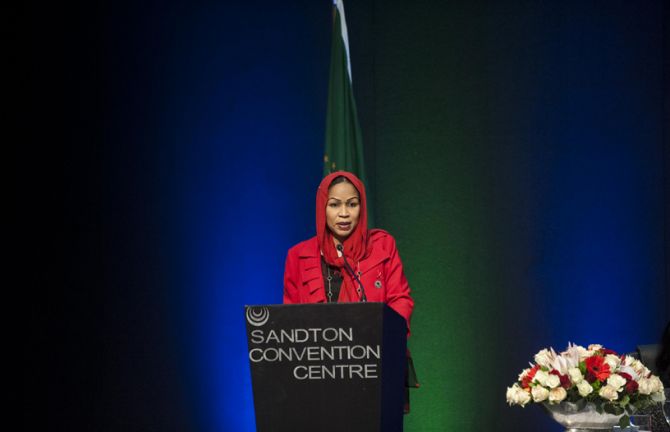
Update
African First Ladies advocate for the ending AIDS epidemic among young women and adolescent girls
16 June 2015
16 June 2015 16 June 2015The need for a holistic approach to HIV prevention among young women and girls was the focus of the 15th Ordinary Assembly of the Organization of African First Ladies, (OAFLA). The meeting was held on the side lines of the 25th African Union Summit, held on 15 June in Johannesburg, South Africa.
The African First Ladies stressed that addressing the needs of young women and adolescent girls must be a priority at all levels of society—from the highest political leadership to schools, families and community leaders. They called for an integrated approach to HIV prevention, treatment and care that addresses all socio-economic and structural drivers which place young women and adolescent girls at a higher risk of HIV infection, including poverty, gender inequality and harmful cultural practices.
Lordina Mahama, First Lady of Ghana and newly-elected President of OAFLA, encouraged all African First Ladies to ensure that the UNAIDS and UNICEF All In! campaign, which focuses on ending adolescent AIDS, is rolled out in their countries.
Quotes
“The time has come to ensure our commitments are translated into concrete action that can be fast tracked and scaled up across the continent. We must unite and hold each other accountable.”
“We must agree to track the progress of our programmes for young women and adolescent girls to ensure that no young person is left behind.”
“I would like to thank UNAIDS for its contribution and partnership. We rely on our partnerships as we cannot do it alone.”
“We must continue to put in place conditions that will ensure young women and adolescent girls can claim their rights, access services for treatment and live free of violence and discrimination.”

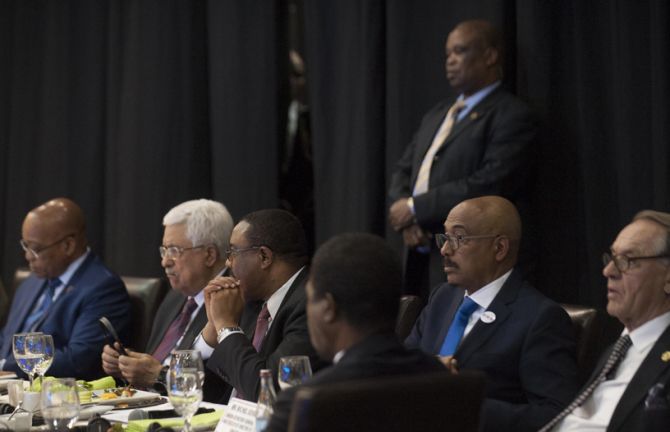
Update
AIDS Watch Africa Heads of State mobilize for an accelerated response to HIV
15 June 2015
15 June 2015 15 June 2015African Heads of State and Government reaffirmed their commitment to provide bold leadership for the AIDS response in Africa during the AIDS Watch Africa (AWA) meeting held on 14 June on the side lines of the 25th African Union Summit in Johannesburg, South Africa.
The need to invest in health, particularly for the sustainable financing of Africa’s massive HIV treatment programme, came under the spotlight. Participants stressed that, in order to end the AIDS epidemic as a public health threat by 2030 in Africa, it is critical to expand treatment coverage and ensure that the millions of people in Africa currently receiving antiretroviral treatment continue to have uninterrupted access for the rest of their lives. Furthermore, investing in local production of antiretroviral medicines, increasing domestic spending and continuing to implement the African Union Roadmap on shared responsibility and global solidarity for AIDS, Tuberculosis and malaria response in Africa were highlighted as key elements to achieve the 90-90-90 targets.
UNAIDS Executive Director, Michel Sidibé, urged African leaders, the AU Commission, representatives of regional economic communities, development partners and civil society present to ensure that the significant investment that has already been made is not lost.
Quotes
“AU recognises that health is a critical aspect of sustainable social and economic development. People say that investment in health is an investment in the future. This is not sufficient. Investment in health is an investment in us all.”
“We are not at the end of the AIDS epidemic yet, but we have seen great improvement. If we tackle the epidemic together, we will succeed in ending AIDS.”
“Our biggest issue is inequity. Unless everyone has equal access to health services it will be difficult to transform our health system. Africa can do it and can continue to show the rest of the world that it is able to transform the future of global health.”
“Now is the time to accelerate and get the commodities we need for the prevention and treatment of AIDS, Tuberculosis and Malaria.”

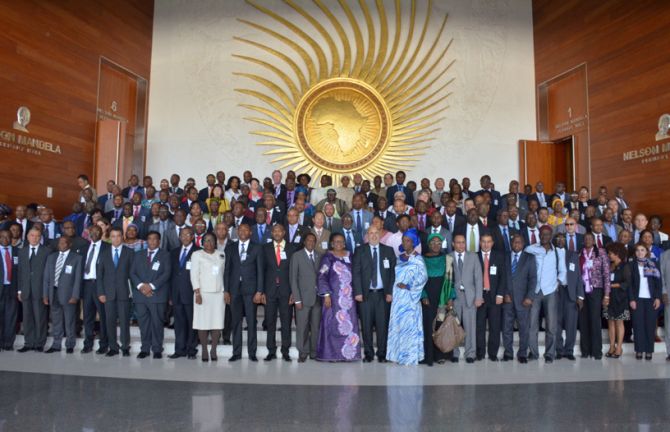
Update
African ministers commit to expanding affordable social protection for all
28 April 2015
28 April 2015 28 April 2015African ministers of social development, labour and employment meeting in Addis Ababa, Ethiopia, have called for expanded social protection for all to ensure inclusive development in Africa. During an event held from 20 to 24 April, and organized by the African Union, ministers agreed that a prosperous Africa can only become a reality if Member States extend comprehensive social protection measures.
Access to affordable and quality education and health services are among the measures that should be expanded to all, in particular vulnerable people. These include people living with and affected by HIV, women, children, people living with disabilities and older people.
The ministers further agreed that social protection policies and programmes in the continent should include social and cash transfers, as well as food and health security.
The 2014 UNAIDS Gap report highlights that cash transfers are a powerful tool for HIV prevention and treatment among young women and people living with HIV. In South Africa, a national study found that a publicly funded cash transfer programme had managed to reduce transactional sex by 53% and age-disparate sex by 71% among adolescent girls in families between 2009 and 2012. This is important in order to reduce their risk of exposure to unsafe sexual behaviour and the low condom use linked to relationships with large age differences.
Quotes
“South Africa was hit hard by HIV, but with high investments from the public and private sectors, including for social protection measures, we’ve been able to drastically reduce the rate of infections. Social protection is an important tool for the AIDS response and inclusive development.”
“We have evidence that social protection is a strategic tool to reduce vulnerabilities and inequalities, eliminate poverty and improve the productivity of the African workforce. Social protection efforts should extend to address gender inequality, HIV and other vulnerabilities in both the formal and informal sectors.”
“We need to ensure a strong social protection agenda that aligns with the African Union Agenda 2063 and is based on human rights. Social protection is important, particularly for women, children, people with disabilities and people from socially excluded groups, to ensure that no one is being left behind.”
Resources
Region/country
- West and Central Africa
- Benin
- Burkina Faso
- Burundi
- Cameroon
- Cape Verde
- Central African Republic
- Chad
- Congo
- Côte d'Ivoire
- Democratic Republic of the Congo
- Equatorial Guinea
- Gabon
- Gambia
- Ghana
- Guinea-Bissau
- Guinea
- Liberia
- Mali
- Mauritania
- Niger
- Nigeria
- Sao Tome and Principe
- Senegal
- Sierra Leone
- Togo
- Eastern and Southern Africa
- Angola
- Botswana
- Comoros
- Eritrea
- Ethiopia
- Kenya
- Lesotho
- Madagascar
- Malawi
- Mauritius
- Mozambique
- Namibia
- Rwanda
- Seychelles
- South Africa
- South Sudan
- Eswatini
- Uganda
- United Republic of Tanzania
- Zambia
- Zimbabwe
Related

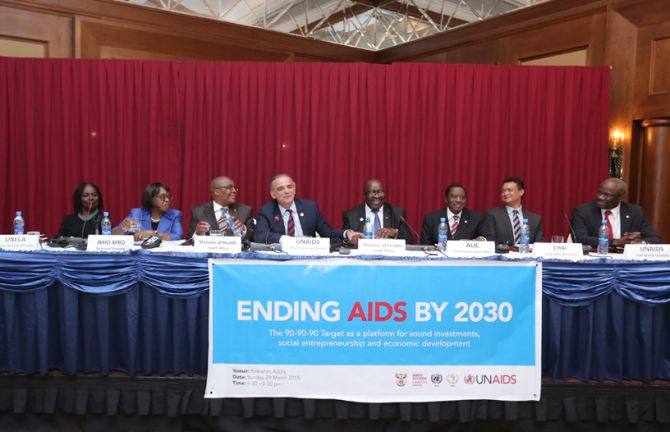
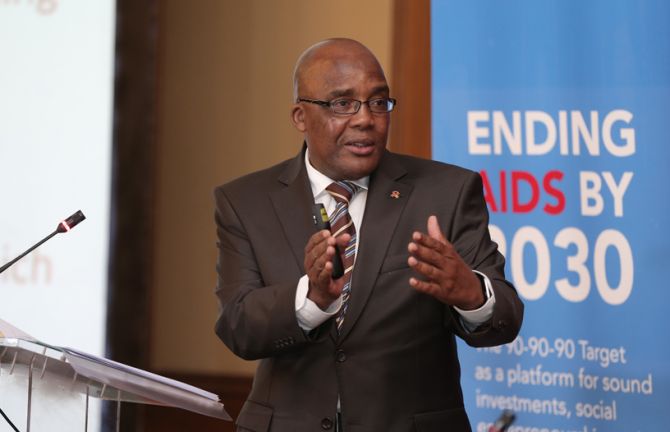
Update
African ministers of finance call for increased investment to end the AIDS epidemic by 2030
01 April 2015
01 April 2015 01 April 2015African ministers of finance and key partners in the AIDS response meeting in Addis Ababa, Ethiopia, have called for increased national investment to end the AIDS epidemic as a public health threat by 2030.
The international community has committed to meeting the 90–90–90 treatment targets, under which 90% of all people living with HIV will know their HIV status, 90% of all people with diagnosed HIV infection will receive sustained antiretroviral therapy and 90% of all people receiving antiretroviral therapy will have viral suppression. If the 90–90–90 targets are met by 2020, ending the AIDS epidemic a decade later is achievable.
The ministers were joined at the meeting, held on 29 March, by representatives of international and regional organizations, United Nations Member States and civil society, as well as other stakeholders. Participants at the high-level event, entitled Ending AIDS by 2030: the 90–90–90 Target as a Platform for Sound Investments, Social Entrepreneurship and Economic Development, stressed that increased domestic investments will bring economic returns. Benefits will include strengthened health systems, long-term cost savings and the encouragement of African pharmaceutical industries.
The event took place on the sidelines of a joint conference of the African Union and the United Nations Economic Commission for Africa entitled Implementing Agenda 2063—Planning, Mobilizing and Financing for Development.
Quotes
“South Africa leveraged the economies of scale generated by the 90–90–90 target to influence the market dynamics of HIV commodities. This includes a recent landmark price reduction of viral load tests.”
“AIDS has eroded decades of health and economic gains and placed a burden on our African countries, but antiretroviral therapy has allowed us to make major progress, and now it is time to harness more resources for 90–90–90 to save lives, costs and to stimulate the continental pharmaceutical industry.”
“If 90% of all people diagnosed with HIV infection should receive sustained antiretroviral therapy, then the continent must move on the trajectory of manufacturing its own drugs and equipment, as envisaged by the Pharmaceutical Manufacturing Plan for Africa.”
“The World Health Organization is committed to working with partners for universal health access, health financing and overcoming communicable diseases, including HIV, as part of the post-2015 development agenda.”
“A healthy and productive population is a precondition for Africa’s structural transformation and sustainable development. We need to increase social investments and budgets for AIDS.”
“We have the evidence and tools to end the epidemic, but we have to change the way we are doing business, accelerate our efforts and enhance the industrial capacity of Africa. Ending the AIDS epidemic is everyone’s business.”
Region/country
- West and Central Africa
- Benin
- Burkina Faso
- Burundi
- Cameroon
- Cape Verde
- Central African Republic
- Chad
- Congo
- Côte d'Ivoire
- Democratic Republic of the Congo
- Equatorial Guinea
- Gabon
- Gambia
- Ghana
- Guinea-Bissau
- Guinea
- Liberia
- Mali
- Mauritania
- Niger
- Nigeria
- Sao Tome and Principe
- Senegal
- Sierra Leone
- Togo
- Eastern and Southern Africa
- Angola
- Botswana
- Comoros
- Eritrea
- Ethiopia
- Kenya
- Lesotho
- Madagascar
- Malawi
- Mauritius
- Mozambique
- Namibia
- Rwanda
- Seychelles
- South Africa
- South Sudan
- Eswatini
- Uganda
- United Republic of Tanzania
- Zambia
- Zimbabwe
Related

Press Release
Champions come together to announce strengthened efforts for an AIDS-free generation in Africa
13 April 2015 13 April 2015JOHANNESBURG, 13 April 2015—The Champions for an AIDS-Free Generation gathered together today to announce new efforts to ensure that all children in Africa are born free from HIV and that children living with HIV have access to life-saving treatment. Since young people continue to be deeply affected by the epidemic, the Champions also announced that they will add adolescents and HIV to their portfolio of work.
“The Champions are determined to keep HIV high on the continental agenda,” said Festus Mogae, Chairperson of the Champions. “We will leave no one behind and we will not rest until Africa has reached the goal of an AIDS-free generation.”
During their three-day meeting, the Champions are scheduled to hold high-level discussions with the President of South Africa, Jacob Zuma, the Deputy President of South Africa, Cyril Ramaphosa, and leading figures from the private sector.
The Champions for an AIDS-Free Generation was launched in 2008 by Mr Mogae, the former President of Botswana. The Champions transcend political partisanship to speak freely and independently about the issues that need solutions, both publically and behind the scenes. Since November, five new leaders have joined their distinguished ranks: Kgalema Motlanthe, former President of South Africa; Joyce Banda, former President of Malawi; Alpha Oumar Konaré, former President of Mali; Olusegun Obasanjo, former President of Nigeria; and Hifikepunye Pohamba, former President of Namibia.
“Today, we come together as a strengthened group of Champions to reaffirm our commitment to ending mother-to-child transmission of HIV and to ensuring that mothers and children already living with HIV stay healthy,” said Ms Banda. “I am proud to be involved in the Champions for an AIDS-Free Generation.”
As the Champions reaffirmed their commitment to an AIDS-free generation, they were joined by partners that include UNAIDS, the United States President’s Emergency Plan for AIDS Relief (PEPFAR) and private sector representatives.
“The Champions have been steadfast in calling for improved HIV prevention and treatment options, and there has been progress,” said UNAIDS Executive Director, Michel Sidibé. “Now, with their ranks strengthened, the Champions will be even stronger advocates to fast-track the AIDS response in Africa to ensure that every baby is born free from HIV and that their mothers stay healthy.”
“An AIDS-free generation is within our grasp if we use the scientific knowledge, data and tools at our disposal,” said Ambassador Deborah Birx, United States Global AIDS Coordinator and United States Special Representative for Global Health Diplomacy. “I am inspired today by this committed group of leaders, who are using their wisdom and influence to move towards an AIDS-free generation in Africa.”
“We need leaders like the Champions who are unafraid to speak out and put AIDS at the very top of Africa’s health agenda,” said Mark Dybul, Executive Director of the Global Fund to Fight AIDS, Tuberculosis and Malaria.
Other partners of the Champions for an AIDS-Free Generation include UNICEF, the World Bank, the South African Development Community (SADC), the SADC Parliamentary Forum, the Economic Community of West African States and the South African Broadcasting Corporation.
The risk of a mother living with HIV passing the virus to her child can be reduced to 5% or less if she has access to antiretroviral medicines during pregnancy, delivery and breastfeeding.
“Women need strong partners like the Champions so they receive access to proper HIV counselling, treatment and prevention services,” said Lorraine Mashishi, a mother living with HIV. “Women living with HIV can avoid passing the virus on to their children if they get the support they need.”
Currently 21 of the 22 countries that are part of the Global Plan to eliminate new HIV infections among children by 2015 and keeping their mothers alive are in Africa. Since 2009, there has been a 43% decline in new HIV infections among children in these countries, but there were still 210 000 (180 000–250 000) new HIV infections among children in sub-Saharan Africa in 2013. Only 42% of children exposed to HIV were tested for the virus within the recommended two months. Without treatment, half of all children living with HIV will die by the age of two and the majority will die by the age of five.
Sub-Saharan Africa remains the region most affected by the AIDS epidemic—in 2013, there were 24.7 million (23.5 million—26.1 million) people living with HIV in the region.
The Champions are:
- Festus Mogae, former President of Botswana and Chairperson of the Champions.
- Joyce Banda, former President of Malawi.
- Joaquim Chissano, former President of Mozambique.
- Kenneth Kaunda, former President of Zambia.
- Alpha Oumar Konaré, former President of Mali.
- Benjamin William Mkapa, former President of the United Republic of Tanzania.
- Kgalema Motlanthe, former President of South Africa.
- Olusegun Obasanjo, former President of Nigeria.
- Hifikepunye Pohamba, former President of Namibia.
- Desmond Tutu, Archbishop Emeritus of Cape Town and Nobel Peace Prize Laureate.
- Speciosa Wandira-Kazibwe, former Vice-President of Uganda.
- Edwin Cameron, Justice of the Constitutional Court of South Africa.
- Miriam Were, former Chairperson of the Kenya National AIDS Control Council.
Champions for an AIDS-Free Generation
The Champions for an AIDS-Free Generation is a distinguished group of former presidents and influential African leaders committed to an AIDS-free generation. Individually and collectively, the Champions rally and support regional leaders towards ending the AIDS epidemic as a public health threat. The Champions transcend political partisanship to speak freely and independently about the issues that need solutions, both publically and behind the scenes. www.aidsfreechampions.org
UNAIDS
The Joint United Nations Programme on HIV/AIDS (UNAIDS) leads and inspires the world to achieve its shared vision of zero new HIV infections, zero discrimination and zero AIDS-related deaths. UNAIDS unites the efforts of 11 UN organizations—UNHCR, UNICEF, WFP, UNDP, UNFPA, UNODC, UN Women, ILO, UNESCO, WHO and the World Bank—and works closely with global and national partners towards ending the AIDS epidemic by 2030. Learn more at unaids.org and connect with us on Facebook and Twitter.

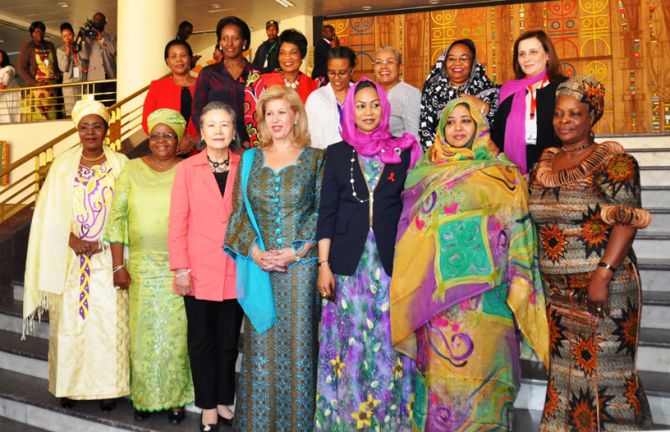
Update
African First Ladies recommit to eliminating mother-to-child transmission of HIV and ending the AIDS epidemic by 2030
11 February 2015
11 February 2015 11 February 2015In the 14th General Assembly of the Organization of Africa First Ladies Against HIV/AIDS (OAFLA), held on 31 January on the sidelines of the 24th African Union Summit in Addis Ababa, Ethiopia, African First Ladies reaffirmed their commitment to the elimination of mother-to-child transmission of HIV and to ending the AIDS epidemic by 2030. The First Ladies also highlighted the importance of paediatric care, strengthening of partnerships and ensuring that AIDS is a strong component in the post-2015 development agenda.
The OAFLA General Assembly was addressed by Yoo (Ban) Soon-taek, who emphasized that women, including young women, adolescent girls, women of child-bearing age, sex workers and transgender women, are a key population in the continental AIDS response and require focused and strategic interventions if we are to end the AIDS epidemic by 2030. She also called for a reinvigorated campaign against new infections among children.
Since the establishment of OAFLA in 2002, African First Ladies have advocated for and raised awareness on AIDS, championing many campaigns on eliminating mother-to-child transmission of HIV, underlining the burden of HIV on women and strengthening networks of people living with HIV.
Quotes
“This is not the time to relent and I commend African First Ladies for joining UNAIDS in boldly calling for the end of AIDS by 2030 and ensuring that HIV and AIDS are a firm part of the post-2015 agenda.”
“Africa needs women, women who are healthy and peaceful, to achieve sustainable socioeconomic development. Therefore, let OAFLA be more aggressive in working alongside our governments to bring women on board.”
“Women are a key population that requires a specific focus if we are to end the AIDS epidemic by 2030. We as partners can end AIDS as a public health threat across the continent by 2030, but to do this, we must re-engage ourselves, our leaders and our partners.”
“Eliminating mother-to-child transmission is a critical component to ending the AIDS epidemic by 2030. By stepping up efforts for this we are not only empowering women and mothers, but we are empowering our children, our families, our communities and our countries towards an AIDS-free generation. UNAIDS stands ready to provide all the necessary support to African First Ladies towards scaling up our joint efforts to eliminate mother-to-child transmission in 2015.”
Region/country
Related

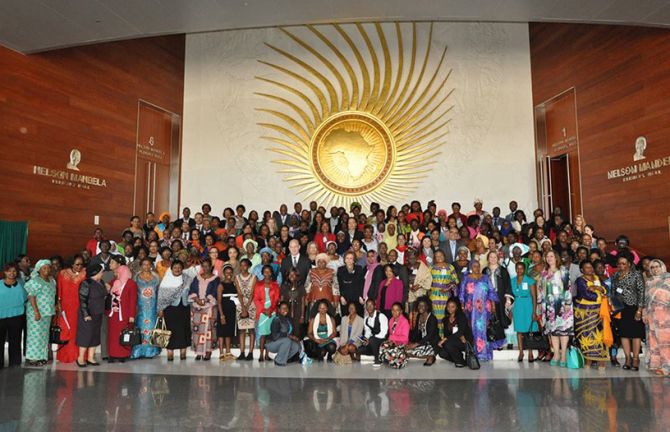
Update
African leaders reaffirm commitment to the AIDS response and women’s empowerment
11 February 2015
11 February 2015 11 February 2015The 24th Summit of the African Union and related events reaffirmed that Africa is committed and will remain committed to women’s empowerment and to ending the AIDS epidemic by 2030. The Summit took place in Addis Ababa, Ethiopia, from 23 to 31 January 2015 under 2015 annual African Union theme of “Women empowerment and development towards Africa’s Agenda 2063”.
The importance of ending AIDS was particularly articulated during the gender pre-summit meeting, at which the participants noted that member states should ensure that ending the AIDS epidemic by 2030 is part of Agenda 2063 and that it has an inclusive human rights approach that leaves no one behind, including children, adolescents, women of child-bearing age and women and girls in conflict and post-conflict settings.
The participants at the pre-summit meeting also noted that member states should ensure that the sexual and reproductive health and rights of African women are implemented without renegotiation of their content.
The Summit adopted Agenda 2063, the African Union vision of the next 50 years, and endorsed the formation of the African Group of Negotiators on the Post-2015 Development Agenda, the single negotiating body acting on behalf of the continent.
Quotes
“We should spare no effort to accelerate progress towards achieving the Millennium Development Goals, or to get as close as possible to doing so in the remaining time.”
“Affordable, quality health care must be a central feature of Africa’s development agenda. The remarkable success of efforts to combat AIDS across the continent show what we can achieve by acting together.”
“We must invest in our people—their health and education, access to water and sanitation—and build resilience and public health systems in order to defeat diseases like Ebola, as well as malaria and HIV.”
“Ending AIDS is achievable if we reduce gender inequalities, including violence. Gender equality requires social transformation, which starts with political leadership and dedicated action.”
Region/country
Related

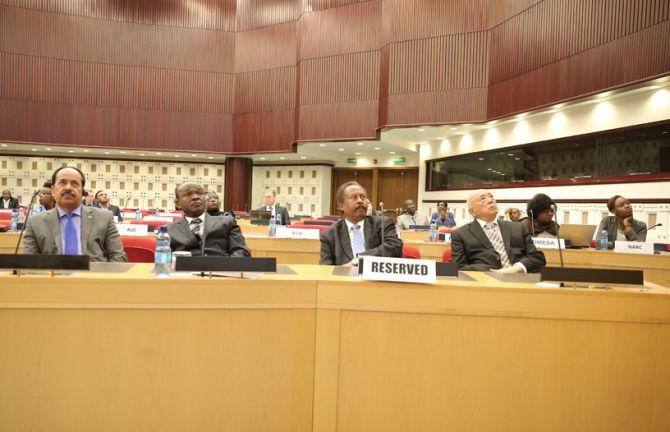
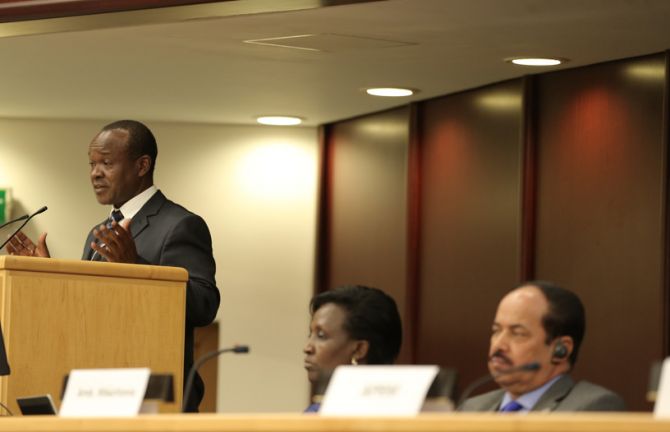
Update
Leaders call for an African road map to end the AIDS epidemic by 2030
27 November 2014
27 November 2014 27 November 2014Leaders of key continental, regional and national institutions concluded that the AIDS epidemic remains a key priority for Africa and must be ended by 2030 in the continent during a High-level Dialogue on Ending AIDS, held on 24 November in Addis Ababa, Ethiopia. The dialogue was hosted by the African Union Commission, the United Nations Economic Commission for Africa and UNAIDS as part of activities to commemorate World AIDS Day 2014.
During the meeting, participants discussed the recommendations in the new UNAIDS report Fast-Track: ending the AIDS epidemic by 2030 and encouraged countries to embrace the targets set to end the AIDS epidemic by 2030. To achieve this goal, participants made several recommendations, which include ensuring the effective use of existing continental accountability mechanisms, such as AIDS Watch Africa and the African Peer Review Mechanism; focusing on innovative ways of increasing domestic financing for health; ensuring sustained access to medicines through local production of drugs; integrating AIDS as part of broader health and development; and ensuring national HIV programmes tailored for young people and populations at higher risk of HIV infection.
Participants of the meeting included ambassadors of African Union Member States, representatives of the African Union Commission, regional economic communities, the African Peer Review Mechanism, AIDS Watch Africa, civil society organizations and development partners, and key opinion leaders, academics and young people.
Quotes
“Ending AIDS is Africa’s responsibility, everyone’s responsibility and indeed a global responsibility.”
“The battle against HIV and AIDS is ours to win.”
“The African Peer Review Mechanism not only assesses and monitors the extent to which commitments are implemented, it also provides the opportunity for policy-makers and ordinary citizens to hold each other accountable.”
“We must step up our efforts in the AIDS response—there must be no room for complacency.”
“We, the youth movement, ask our leaders to walk away from this dialogue with these commitments—action towards adopting targets for universal sexual and reproductive health and rights, and ending the AIDS epidemic by 2030 in the post-2015 development agenda.”
“The commitment to end the AIDS epidemic is already there. What we now need is a clear strategy to achieve this ambitious target.”






